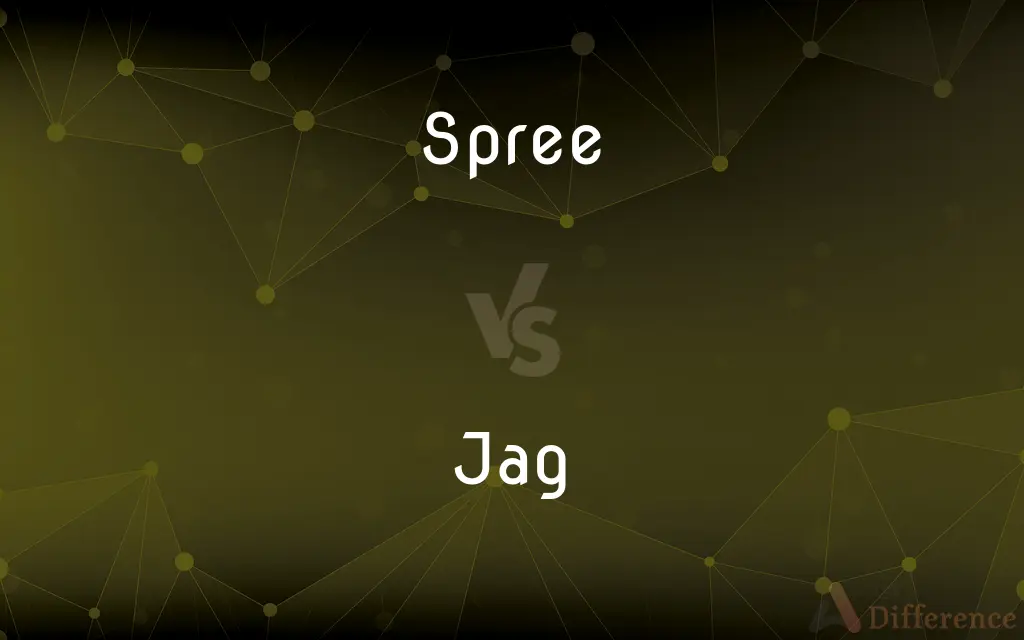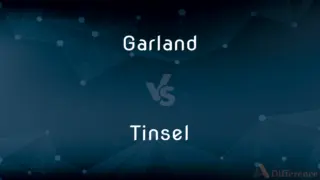Spree vs. Jag — What's the Difference?
Edited by Tayyaba Rehman — By Fiza Rafique — Updated on April 15, 2024
A "spree" refers to a sustained period of unrestrained activity, often used in contexts like shopping or violence, while "jag" describes a short burst of emotion or activity, typically less structured and more spontaneous.

Difference Between Spree and Jag
Table of Contents
ADVERTISEMENT
Key Differences
A spree typically involves a prolonged period of indulgent behavior in activities such as shopping, drinking, or eating. This term is often used to describe events that are planned or have a somewhat predictable pattern. In contrast, a jag is usually a brief, intense outburst of behavior, often emotional or related to sudden whims, and lacks a structured nature.
While sprees can be seen in contexts like a "shopping spree," where the activity is both intensive and extensive over time, jags are often described in terms of emotional expressions, such as a "crying jag," emphasizing their spontaneous and episodic nature.
Spree has connotations that can range from positive, like holiday shopping, to negative, such as in "crime spree." On the other hand, jag typically carries a more neutral or sometimes negative connotation, reflecting an uncontrollable or overwhelming burst, such as in a "drinking jag."
In terms of duration and planning, a spree usually spans a longer period and might involve some level of planning or intent, such as setting out for a day of back-to-back activities. Conversely, a jag is more about suddenness and is rarely premeditated, often arising unexpectedly.
The term "spree" can be used more broadly and formally in various contexts, from festive to dangerous activities. "Jag," however, is more colloquial and often linked to personal behaviors or emotional states, making it less likely to be used in formal contexts.
ADVERTISEMENT
Comparison Chart
Definition
Extended period of unrestrained activity
Short burst of intense activity or emotion
Common Usage
Shopping spree, crime spree
Crying jag, drinking jag
Duration
Longer, sustained
Short, abrupt
Planning
Often planned or patterned
Spontaneous, unplanned
Connotation
Can be positive or negative
Generally neutral or negative
Compare with Definitions
Spree
A period of unrestrained activity.
She went on a shopping spree at the mall.
Jag
Colloquially used to refer to emotional outbursts.
She experienced a jag of anger during the meeting.
Spree
Typically involves multiple or sequential activities.
Their holiday was a non-stop tourist spree.
Jag
Often unplanned and spontaneous.
Her crying jag was sudden and intense.
Spree
Sometimes planned or expected.
Their annual Black Friday shopping spree is a family tradition.
Jag
Can describe a bout of indulgence, especially in negative contexts.
He went on a drinking jag last weekend.
Spree
Often used to describe indulgent or excessive actions.
The couple went on a dining spree in Italy.
Jag
A short burst of intense activity or emotion.
He had a laughing jag at the joke.
Spree
Can be associated with negative behaviors.
The news reported a crime spree in the city.
Jag
Usually brief and episodic.
He went on a brief creative jag, painting through the night.
Spree
A sudden indulgence in or outburst of an activity
A shopping spree.
A crime spree.
Jag
A sharp projection; a barb.
Spree
A carefree, lively outing.
Jag
A hanging flap along the edge of a garment.
Spree
(in combination) Uninhibited activity.
Spending spree
Jag
A slash or slit in a garment exposing material of a different color.
Spree
(dated) A merry frolic; especially, a drinking frolic.
Jag
A bout of drinking or drug use.
Spree
To engage in a spree.
Jag
A period of overindulgence in an activity; a spree
A shopping jag.
A crying jag.
Spree
A merry frolic; especially, a drinking frolic; a carousal.
Jag
A small load or portion.
Spree
A brief indulgence of your impulses
Jag
To cut jags in; notch.
Spree
Engage withour restraint in an activity and indulge, as when shopping
Jag
To cut unevenly.
Jag
(Scots) To jab sharply; prick.
Jag
A sharp projection.
Jag
A part broken off; a fragment.
Jag
A flap, a tear in a clothing
Jag
(botany) A cleft or division.
Jag
(Scotland) A medical injection, a jab.
Jag
A thorn from a bush see jaggerbush.
Jag
: An irritating, inept, or repugnant person.
Jag
Enough liquor to make a person noticeably drunk; a skinful.
Jag
A binge or period of overindulgence; a spree.
Jag
A fit, spell, outburst.
Jag
A one-horse cart load, or, in modern times, a truck load, of hay or wood.
Jag
A leather bag or wallet; (in the plural) saddlebags.
Jag
To cut unevenly.
Jag
(Western Pennsylvania English) To tease.
Jag
A notch; a cleft; a barb; a ragged or sharp protuberance; a denticulation.
Arethuss arose . . . From rock and from jag.
Garments thus beset with long jags.
Jag
A part broken off; a fragment.
Jag
A cleft or division.
Jag
A leather bag or wallet;
Jag
Enough liquor to make a man noticeably drunk; a small "load;" a time or case of drunkeness; - esp. in phr. To have a jag on, to be drunk.
Jag
A small load, as of hay or grain in the straw, or of ore.
Jag
Same as Judge-Advocate General.
Jag
To cut into notches or teeth like those of a saw; to notch.
Jag
To carry, as a load; as, to jag hay, etc.
Jag
A sharp projection on an edge or surface;
He clutched a jag of the rock
Jag
A slit in a garment that exposes material of a different color underneath; used in Renaissance clothing
Jag
A flap along the edge of a garment; used in medieval clothing
Jag
A bout of drinking or drug taking
Jag
Cut teeth into; make a jagged cutting edge
Common Curiosities
What is a jag?
A jag refers to a brief, intense burst of activity or emotion, typically spontaneous and unplanned.
What are common contexts to use spree?
Spree is commonly used in terms like "shopping spree" or "crime spree."
What is a spree?
A spree is a sustained period of indulgent and often unrestrained activity, which can be either positive or negative.
What are common contexts to use jag?
Jag is often used in personal or emotional contexts like "crying jag" or "drinking jag."
Can spree be used in a positive way?
Yes, spree can have a positive connotation, such as in "shopping spree."
What emotional implications does jag carry?
Jag often implies an uncontrollable or overwhelming nature of the emotional or behavioral burst.
Can both spree and jag have negative connotations?
Yes, both can have negative connotations, especially when referring to excessive or harmful behaviors.
How do spree and jag differ in duration?
A spree is longer and more sustained, whereas a jag is brief and episodic.
Which term is more likely to be used formally?
"Spree" is more likely to be used in formal contexts, while "jag" is typically more colloquial.
How should one understand the usage of spree in media?
In media, spree often describes a series of actions or events, highlighting either celebration or concern.
Are there cultural differences in the usage of spree and jag?
The usage of both terms can vary, with "spree" being more universally understood and "jag" more specific to certain English-speaking regions.
Is planning involved in a spree or a jag?
A spree might involve some planning, while a jag is generally spontaneous.
How do the durations of spree and jag affect their perception?
The longer duration of a spree often gives it a more impactful or deliberate perception, whereas the briefness of a jag conveys spontaneity.
What is a key difference in the activity type between spree and jag?
Spree often involves sequential or multiple activities, while jag is characterized by a single, intense episode.
Is jag ever used in a positive context?
While less common, jag can sometimes be used in a positive light, particularly in creative or humorous contexts.
Share Your Discovery

Previous Comparison
Garland vs. Tinsel
Next Comparison
Echolocation vs. SonarAuthor Spotlight
Written by
Fiza RafiqueFiza Rafique is a skilled content writer at AskDifference.com, where she meticulously refines and enhances written pieces. Drawing from her vast editorial expertise, Fiza ensures clarity, accuracy, and precision in every article. Passionate about language, she continually seeks to elevate the quality of content for readers worldwide.
Edited by
Tayyaba RehmanTayyaba Rehman is a distinguished writer, currently serving as a primary contributor to askdifference.com. As a researcher in semantics and etymology, Tayyaba's passion for the complexity of languages and their distinctions has found a perfect home on the platform. Tayyaba delves into the intricacies of language, distinguishing between commonly confused words and phrases, thereby providing clarity for readers worldwide.
















































